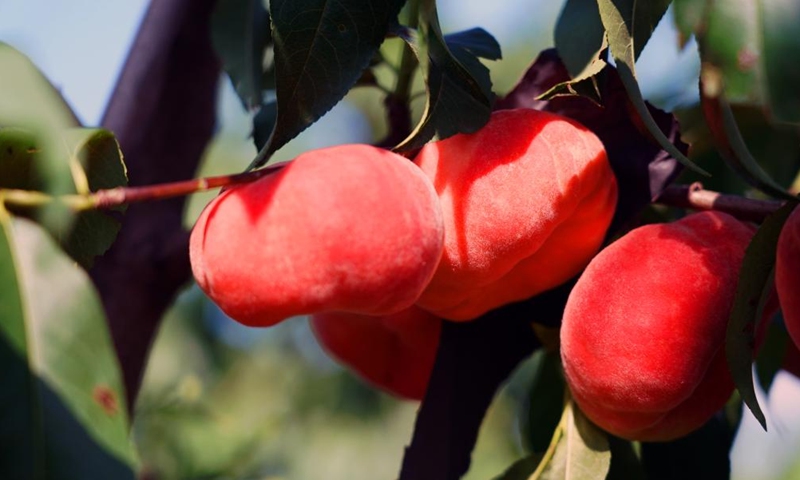
Photo taken on Aug. 9, 2022 shows peaches at an orchard in Yukou Town of Pinggu District, Beijing, capital of China.(Xinhua/Ren Chao)
For Zhang Guorong, selling peaches is an easy job that needs only a smartphone.
In the early morning, with her phone ready to live stream, Zhang started picking peaches in her orchard in Beijing's Pinggu District. Her online hawking will soon draw many consumers nationwide.
"Live streaming helped me sell around 70 kg of peaches on average per day during this year's peach season from July to October," Zhang said.
Surrounded by mountains on three sides, Pinggu District in Beijing's northeastern suburb has a natural fertile ground for peach trees. Thanks to policy and technology support, the district has become known as the "hometown of peaches."
As online shopping has become increasingly popular, the district launched a project in 2017. A professional team was set up to teach farmers to sell their peaches with mobile phones and transform the local peach industry into a modernized internet-plus business.
Peach sales via e-commerce across Pinggu stood at 25 million kg in 2021, compared with nearly zero in 2012, according to Wang Na with the district's bureau of commerce.
"The peach supply falls short of demand, and now my products are sold to other provinces across the country, including Sichuan, Guangdong and Shandong," said Wang Zilong, a local farmer who owns a peach orchard of about 13 hectares.
The swelling online demand for peaches has also boosted the development of the local logistics industry. Many logistics giants, such as SF Express and China Post, have been brought in, thus slashing the delivery fees.
Delivering a box of peaches from Pinggu to other districts in Beijing costs only about 9 yuan (about 1.26 U.S. dollars) now. It is much lower than 40-plus yuan in 2012 when local e-commerce was just in its infancy, said Xiong Yujin, director of Pinggu's e-commerce service center.
With 161 delivery stations, courier service is now accessible to all villages in Pinggu. From January to July, the district saw a total of 2.34 million express deliveries of peaches, up 20 percent year on year, according to Wang Na.
Many young people have been drawn to the district to jump on its e-commerce bandwagon. "When I first came to Pinggu in 2012, there were only a few young people doing e-commerce, but more than 1,000 are involved in the sector now," said Xiong.
Statistics show that the annual output of the peaches in Pinggu has exceeded 170 million kg, with total revenue of more than 1.2 billion yuan. The peach economy has also driven the sales of other agricultural products in the district and promoted leisure agriculture featuring bed and breakfasts (B&Bs), camping and rural cuisine.
With government support, Pinggu started building itself into an agricultural innovation hub last year, focusing on the modern seed industry, biotechnology, smart farming and food safety.
"Looking into the future, the district will strive to spearhead efforts in rural revitalization and modernization of agriculture and the countryside," said Tang Hailong, Party chief of Pinggu.




